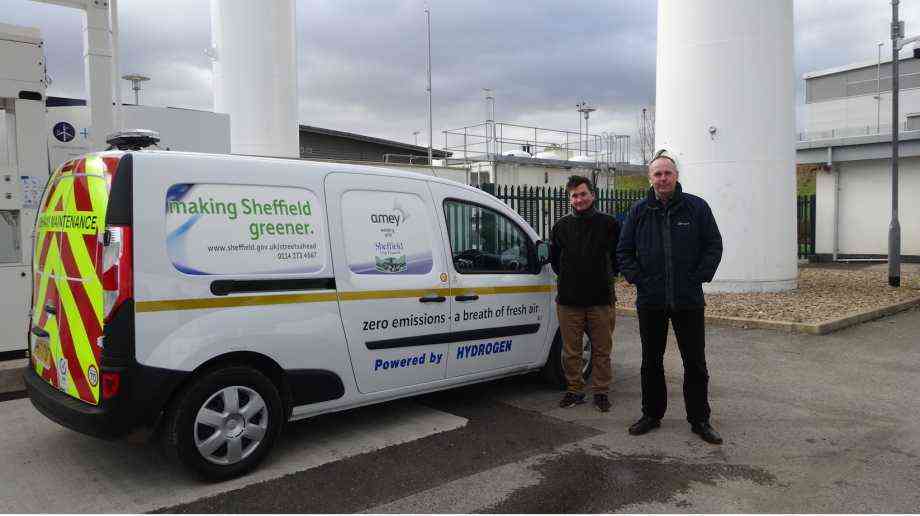
A growing eco-fleet for Streets Ahead
Sheffield City Council’s highways maintenance project, Streets Ahead, has a growing alternatively‑fuelled fleet, including hydrogen vans and electric vehicles. GreenFleet chats to Thomas Cullingford, environment manager at Amey, the firm delivering the contract
What is Streets Ahead and what makes up its fleet?
Sheffield’s Streets Ahead project began in 2012 and is a city-wide 25 year highways maintenance contract between Amey and Sheffield City Council that is bringing the city’s roads, pavements, streetlights and streetscene up to standard.
The first five years of the contract saw a huge drive to radically upgrade the city’s infrastructure. The Sheffield team have successfully resurfaced 1,475 miles of footways (approximately 70 per cent); resurfaced 727 miles of highways (approximately 65 per cent), and made improvements to 1,314 bridges and other highways structures. The project has also installed 65, 435 LED street lights, removed and replanted 4,870 trees, and replaced 3,208 gullies
Every day for the past five years, more than a mile of footway and over half a mile road was being resurfaced. We have completed a huge amount of work, which has had a significant and positive impact on Sheffield residents through improved roads, pavements, structures and street lighting. This major project is contributing to the wider regeneration of the city and is a major investment in Sheffield’s future.
We require a significant fleet of vehicles to support the delivery of the contract. We have over 180 vehicles including 100 large vehicles (7.5 ton to 26 ton) and 80 small vehicles (cars/vans).
All the small vehicle fleet is due to be replaced this summer. The new small vehicle fleet has updated and improved performance technology, plus due to our positive experience of electric vehicles we are expanding our fleet from two to 16 vehicles.
What led to the decision to buy alternatively‑fuelled vans?
Amey is committed to sustainability, the environment and innovation. The environmental and transport managers in Sheffield heard about the development of new hydrogen alternatively-fuelled vehicles and investigated to see whether this was a feasible option to support the work in Sheffield. A business case was developed and with Amey management support, the decision was made to embrace this new technology. Working in partnership with Arcola Energy and Hitachi leasing we are participating in a Department of Transport trial to assess the efficacy of this environmentally friendly solution.
How will the hydrogen vans be used?
Our Highways Inspection team are using the vehicles daily, mainly within the Sheffield boundaries, and we have fitted additional equipment to enable us to measure the highway accurately. The vehicles are refuelled at the ITM Power facility which is based on the Advanced Manufacturing Research Centre on the edge of Sheffield.
What needs to be improved to make hydrogen a viable fuel?
The general availability of fuel needs to be improved and continued commitment by the government to the technology. Unfortunately, the early support provided by the government to these projects is being removed. The impact of this will probably mean that there will be a reluctance to invest in developing vehicles or the infrastructure due to costs associated with it. We have worked closely with Arcola Energy to overcome teething problems and provide feedback on the vehicles.
How many electric vehicles do you operate and how are they used?
We currently operate two full electric vehicles and two Hydrogen cell/electric vehicles but are committed to increasing our fleet stock of electric vehicles to 16 when the new generation is released In April 2018.
Our electric vehicles are charged on site (Olive Grove Depot). Our overnight mains charging is giving us good returns due to an excellent rate per unit direct from basic three pin supply.
How have the drivers taken to alternatively-fuelled vehicles?
The drivers are extremely positive about them. We did have concerns about the range the vehicles would have but they are fulfilling our operational needs and purpose. The new generation will deliver higher miles per charge and this will fit well into our local service.
How much are you saving in emissions and costs?
We predicted to save a third in fuel costs. This has been tested over six months with positive results – to date we anticipate approx £1,500 saving per year per vehicle for lease, fuel and road tax (although lease costs are subject to change) and 2,753kg CO2 per annum per vehicle.
Other benefits we are seeing from our electric vehicles include cheaper fuel costs, less noise, and easier maintenance.
Are you greening your operations in any other ways?
All drivers are assessed by in house ROSPA trainers before driving and all vehicles are fitted with telematics that assesses and identifies improvement opportunities for drivers. Driver behaviours are challenged around idling, speeding, harsh acceleration and braking and Sheffield is scoring very well nationally within Amey.
What are your future plans for greening the rest of the fleet?
We are replacing our small vehicle fleet in the next few months and we are investing in an additional 14 electric vans. We are looking at the commercial market for our larger vehicles and will investigate this further next year as our current fleet comes to the end of its lease. Early indications are liquid petroleum and compressed gases may be the way forward but electric is catching up due to more investment by personal users and companies like Amey.
What advice would you give to other fleets looking to buy alternatively-fuelled vehicles?
Go for it. It’s cheaper (electricity), and more environmentally friendly. Make sure you have charging points installed first and your daily usage is within the daily range of the vehicle. But take advice, look at the options available and embrace the technology – which is improving and will carry on improving. Stay curious, keep looking at the alternative technologies and try them.
Please register to comment on this article

